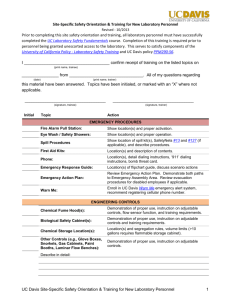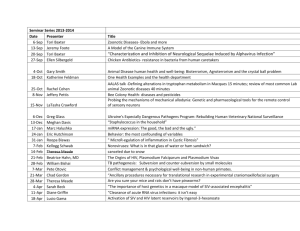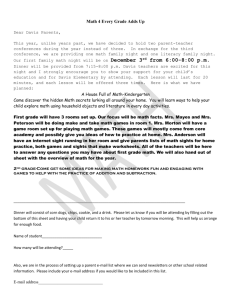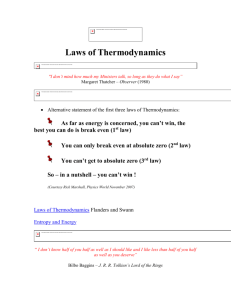Davis Tracy
advertisement
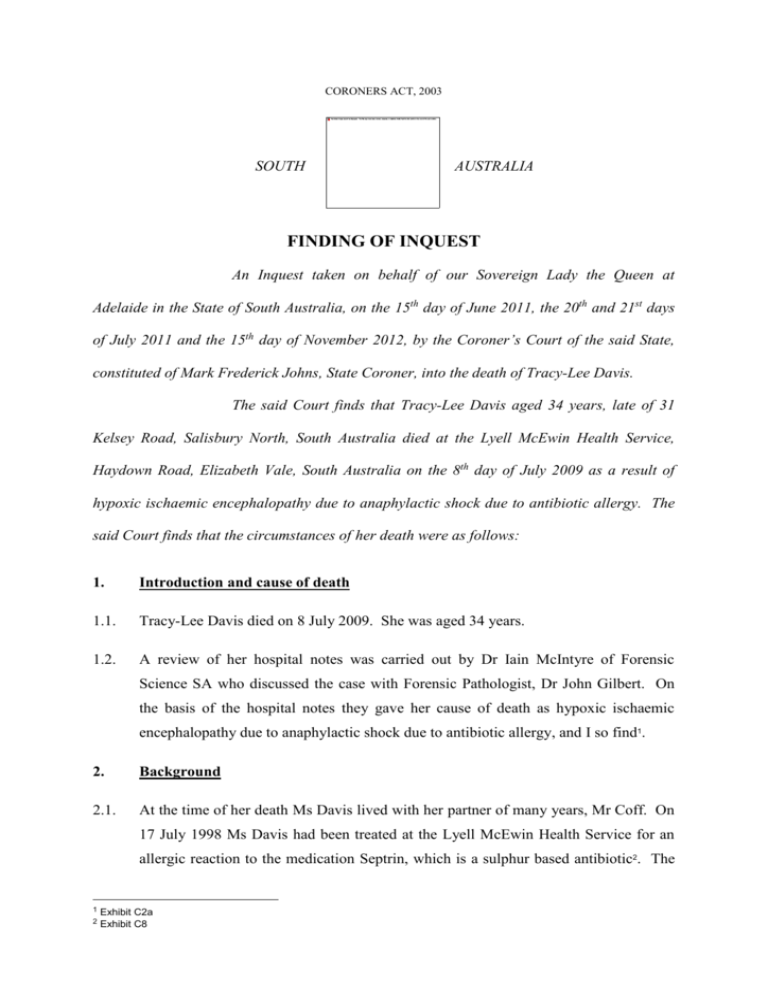
CORONERS ACT, 2003 SOUTH AUSTRALIA FINDING OF INQUEST An Inquest taken on behalf of our Sovereign Lady the Queen at Adelaide in the State of South Australia, on the 15th day of June 2011, the 20th and 21st days of July 2011 and the 15th day of November 2012, by the Coroner’s Court of the said State, constituted of Mark Frederick Johns, State Coroner, into the death of Tracy-Lee Davis. The said Court finds that Tracy-Lee Davis aged 34 years, late of 31 Kelsey Road, Salisbury North, South Australia died at the Lyell McEwin Health Service, Haydown Road, Elizabeth Vale, South Australia on the 8th day of July 2009 as a result of hypoxic ischaemic encephalopathy due to anaphylactic shock due to antibiotic allergy. The said Court finds that the circumstances of her death were as follows: 1. Introduction and cause of death 1.1. Tracy-Lee Davis died on 8 July 2009. She was aged 34 years. 1.2. A review of her hospital notes was carried out by Dr Iain McIntyre of Forensic Science SA who discussed the case with Forensic Pathologist, Dr John Gilbert. On the basis of the hospital notes they gave her cause of death as hypoxic ischaemic encephalopathy due to anaphylactic shock due to antibiotic allergy, and I so find1. 2. Background 2.1. At the time of her death Ms Davis lived with her partner of many years, Mr Coff. On 17 July 1998 Ms Davis had been treated at the Lyell McEwin Health Service for an allergic reaction to the medication Septrin, which is a sulphur based antibiotic2. The 1 2 Exhibit C2a Exhibit C8 2 Lyell McEwin Health Service notes also show that the hospital had noted that she had an allergy to the bactrim class of antibiotics3. 2.2. In September 2004 Ms Davis presented with an allergy to Cephalexin which is one of the Cephalosporin categories of antibiotics4. Furthermore, according to the Lyell McEwin Health Service notes, Ms Davis also had an allergy to penicillin. 2.3. Ms Davis was a patient of the Europa Medical Centre and there appears on the front page of her medical notes5 from that centre a warning that she was allergic to Ibilex which is an antibiotic in the Cephalosporin class. She was also listed as being allergic to the antibiotic, Ilosone, and also to sulphur based antibiotics. 2.4. On 6 July 2009 Ms Davis left the house she shared with Mr Coff early in the morning to commence work at 7am. Mr Coff was preparing to leave for work himself when Ms Davis returned home. She informed him that she had a sore ear and got back into bed. Mr Coff left for work. 2.5. Mr Coff gave evidence that in the next couple of hours he and Ms Davis exchanged text messages. Mr Coff was aware that Ms Davis had made a medical appointment for 11am that day. 2.6. In the result, Ms Davis saw Dr Arpad Got at the Europa Medical Centre that morning, shortly after 11am. The notes record that Dr Got examined Ms Davis. The medical notes for the Europa Clinic6 contain his record which relevantly reads as follows: 'Otis external LD Ceclor 375mg BD' 2.7. Dr Got made a statement which was received in evidence7 in which he explained that he found Ms Davis to have right-sided otitis external. He decided that she needed to be treated with an antibiotic and he prescribed her Ceclor 375mg twice per day and wrote a prescription by hand. After Ms Davis had left the consulting room Dr Got entered this consultation record on the computer. The time of this entry in the case notes is 11:17am. 3 Exhibit C8 Exhibit C8 5 Exhibit C10b 6 Exhibit C10b 7 Exhibit C10 4 3 2.8. Ms Davis subsequently had the script filled. Shortly after midday Mr Coff returned to their home to check on Ms Davis. When he arrived home Mr Coff found Ms Davis in the bedroom lying across their bed in a prone position. She appeared to have red welts on her legs. Mr Coff turned her over and found her to be unconscious. He called an ambulance and the South Australian Ambulance Service casenotes show that the call was received at 12:18pm. Mr Coff commenced CPR. The ambulance arrived at 12:26pm and the paramedics found Ms Davis to be in cardiac arrest. She had no pulse, no respiration and her GCS8 score was recorded as 3. Adrenaline and atropine were administered at the scene and she was intubated. A box of medication with the name Cefalor was seized from the lounge room table by paramedics. One tablet was noted to be missing from the blister pack. 2.9. Ms Davis was transferred to the Lyell McEwin Health Service where she was placed on life support in the Intensive Care Unit. Over the next two days her condition deteriorated with a loss of spontaneous respiration, increasing hypertension and then hypotension and hypothermia. A brain perfusion scan undertaken on 7 July 2009 showed no cerebral flow. A family meeting took place on 8 July 2009 and it was decided that Ms Davis’ life support would be switched off and her organs donated. She was pronounced deceased at 1307 hours on 8 July 2009. 3. Dr Arpad Got 3.1. Normally in a case such as this it would have been expected that the Court would have heard evidence from Dr Got. Indeed, a summons was issued by the Court requiring Dr Got to attend for that purpose. However, I was asked to make a ruling excusing Dr Got from the obligation to give evidence and for that purpose was provided with further material, including an affidavit of Dr Got9 himself, an affidavit made by his daughter10 and two psychiatric reports11 from Dr Got’s treating psychiatrist. As a result of considering this material I ruled that Dr Got would be excused from giving evidence. 3.2. The material disclosed that Dr Got obtained his medical degree in Budapest in 1950 and subsequently moved to Australia. Dr Got was 83 years old at the time of his 8 Glasgow Coma Scale - A scale for measuring level of consciousness in which scoring is determined by three factors: amount of eye opening, verbal responsiveness, and motor responsiveness 9 Exhibit C10 10 Exhibits C9c and C9d 11 Exhibit C9e 4 consultation with Ms Davis. Dr Got said that he examined Ms Davis on 6 July 2009 and he said that he did not see an allergy alert on the computer screen at the time that he was typing his notes of the consultation, which he did after Ms Davis had left the consulting rooms. Dr Got deposed to his knowledge about the computer system at the Europa Medical Centre. He frankly acknowledged that he was never very proficient on the computer. He acknowledged that it was not his practice to make notes on the computer whilst the patient was in the consulting room. He said that he failed to observe the entry in Ms Davis’ notes which indicated her allergy and that his only explanation is that, contrary to his normal practice, he did not review her notes to look for a reference to allergies and he accepted in an affidavit that his omission had what he described as catastrophic consequences. Dr Got said that within days of Ms Davis’ death he resigned from the Europa Medical Centre and ceased to practise medicine. His registration as a medical practitioner subsequently lapsed. Dr Got has not sought re-registration since and does not intend to do so. Dr Got said that Ms Davis’ death had a profound effect on his health. He continues to see and receive psychiatric and psychological care. Dr Got’s daughter deposed12 that she believes that her father’s depressive and anxiety disorder stems from his experiences during World War II. His parents, brother and sister were all killed at the Auschwitz Concentration Camp in World War II. Dr Got was the only member of his family to survive and he was forced to work in the labour camp. He fled to Australia in 1956 and seems to have suffered as a result of those terrible experiences. 3.3. A psychiatric report of Dr Patrick Flynn13 dated 11 July 2011 reports the unremitting nature of the depressive illness from which Dr Got continues to suffer, and that despite treatment his depression continued with anhedonia, sleep changes, weight loss, amotivation and self-reproach. The condition was only partially relieved with medication treatment. Dr Got demonstrated considerable guilt, shame and self-reproach relating to the effect of his treatment on Ms Davis. His mental state was brittle and his physical state frail. His ability to give accurate information in oral evidence before the Coroner would in the opinion of Dr Flynn be compromised by his depression and it was Dr Flynn’s opinion that his psychiatric state would not be sufficiently robust or focused to stand up to robust questioning in Court. As a result of this information I decided to excuse Dr Got from the requirement to attend and 12 13 Exhibits C9c and C9d Exhibit C9e 5 give evidence. It was my opinion that little purpose would be served by way of obtaining further information from Dr Got and in the knowledge that a significant amount of information had already been obtained from him by way of affidavit and his statements. 3.4. From the material provided by Dr Got I find that he had a poor or almost non-existent recollection of his examination of Ms Davis. Clearly though he did examine her ears to reach the conclusion of a diagnosis of otitis external. He said that he had a standard practice of asking patients what medications they were taking and whether they had any allergies. However, in the circumstances I am not prepared to find that he did ask Ms Davis that crucial question on 6 July 2009. Instead, I make no finding as to whether he asked such a question or not. That is based on his acknowledgement that he had no clear recollection one way or another, and his lack of any note to that effect. Furthermore, it does appear to me to be unlikely that Ms Davis would have given an incorrect answer to such a crucial question. Nevertheless, I am not in a position to make a finding one way or the other on that subject and refrain from doing so. What is clear however is that Dr Got did not suggest, and his counsel acknowledges, that whether such a conversation took place or not, it would not have relieved Dr Got from the obligation of checking the medical record in relation to allergies. It is clear that the consultation, including the prescription of Ceclor, occurred before Dr Got made an entry in the computer system or looked at the computer record. It is also clear that Dr Got failed to see the warning as to allergies which he himself acknowledged would have been evident on the computer screen at the time he made his entry after Ms Davis had left the surgery. 3.5. Dr Got acknowledged in his statements that he was aware in July 2009 that Ceclor is in the same category of antibiotics as Ibilex which is referred to in the computer records. He said that had he been aware of Ms Davis’ allergy to Ibilex he would not have prescribed Ceclor. In the end, he could say nothing more than that he just could not have seen the allergy alert when he made his note in the computer records. 3.6. Dr Got accepted that there is clear evidence of an anaphylactic response due to the ingestion of Ceclor, and I so find. Evidence that supports this conclusion, apart from the expert opinion of Dr McIntyre, is as follows: 1) Firstly the red welts that were found on Ms Davis’ legs by Mr Coff; 6 2) Secondly, the observations of the paramedics which are supportive of an anaphylactic reaction; and 3) Thirdly, a Serum Triptase Report from the Lyell McEwin Health Service consistent with anaphylaxis. 3.7. Dr Got maintained through his counsel that there was no evidence that he had any physical or cognitive disability at the time of his examination of Ms Davis. That is correct and I make no finding or suggestion to that effect. 3.8. Nevertheless, it is concerning that the health system in this country has reached a point where there is such a scarcity of medical practitioners that a doctor can still be practising at the age of 83 years. In my view this in itself is a cause for concern and does not reflect well on policies and decisions of previous Governments, State and Federal, that has led to this shortage of doctors. 4. Recommendations 4.1. Pursuant to Section 25(2) of the Coroners Act 2003 I am empowered to make recommendations that in the opinion of the Court might prevent, or reduce the likelihood of, a recurrence of an event similar to the event that was the subject of the Inquest. 4.2. I recommend that the Minister for Health raises this case with the Minister’s Federal counterpart to investigate whether there are sufficient doctors to meet the requirements of this State. Key Words: Anaphylactic Shock In witness whereof the said Coroner has hereunto set and subscribed his hand and Seal the 15th day of November, 2012. State Coroner Inquest Number 26/2011 (1094/2009)

